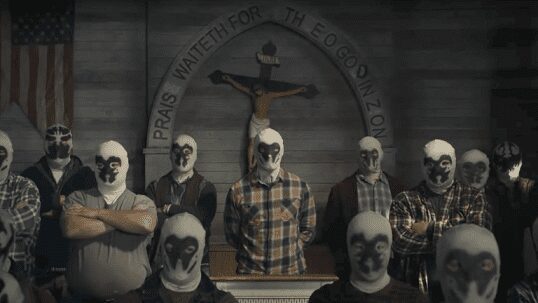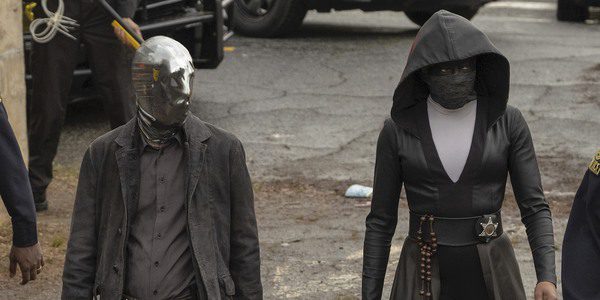Watchmen
HBO
Season 1, Episodes 1-10
The topic of Watchmen is a touchy one. The graphic novel, created by Alan Moore and Dave Gibbons, is considered a sacred cow in comic book circles. Thus, any works related to it will be put under intense scrutiny. I learned that inn January of this year, when I was in my local comic shop where, of course, the topic of the new Watchmen TV series came up. While I quite enjoyed it, other folks were more mixed in their opinions.
“The acting is good, I just don’t know if I really like the shift to modern day,” one man said while shaking his head.
“I do,” I said. “The comic focused on nuclear paranoia during the Cold War, which made sense because it was in the ‘80s. The new series is set today, so it makes sense that the underlying fear in this one would be white supremacy.”
The man, who was white, tilted his head. “Is that really an issue today though?”
Watchmen was relevant even when it first debuted on October 20, 2019. It was relevant when it ended on December 15, 2019. And now, just five months after its debut, it’s looking positively prescient. Discussions of white supremacy and how it’s permeated in America are everywhere, spurred by the murder of George Floyd. Floyd’s killing on May 25 happened to occur near the 99th anniversary of another episode of hateful racial violence in American history, the Tulsa Massacre.

A dramatization of the massacre serves as the opening sequence for HBO’s Watchmen. Its images are searing and terrifying. Men and women run screaming as their businesses are set on fire. Men in white robes shoot bystanders and those who attempt to flee. Planes fly overhead, dropping bombs on property. A young boy cradles a dead infant in his arms. It’s so horrifying, many on social media first assumed that it was a fictional event created for the show. The fact that suchl an event occurred, was so horrible that folks assumed it was fictional, and was so hushed up that it took a superhero TV series to shine a light on it, speaks to its chilling necessity. To quote David Dennis Jr.’s essay on Watchmen, the sequence of white supremacist violence shows that “blackness is a superhero origin story.”
When the series moves forward thirty years in time to present day Tulsa, we are in the fourth term of a Robert Redford presidency. Redford’s administration has given reparations to the descendants of those who survived the Tulsa Massacre. On the surface, Watchmen’s United States appears to be a progressive utopia. But we very quickly see this is not the case. As in our world, masks are ubiquitous here. The most obvious masks are worn by the Seventh Kavalry, a white supremacist militia/cult whose philosophy is based on a twisted interpretation of the writings of Rorschach, one of the protagonists of the original comic. But masks are also worn by police, now a necessity after almost all of Tulsa’s police force was murdered by the Kavalry three years ago in an event called the White Night.
When a police officer is shot and critically injured by a Seventh Kavalry member, it falls on Detective Angela Abar, a.k.a., Sister Night, (Regina King) to uncover the members of the Seventh Kavalry and just what they are planning. It’s only when she begins to dig deeper that she begins to discover a much more vast and insidious conspiracy.
It’s in Abar’s investigation of that conspiracy that Watchmen begins an investigation of its own. In one particularly startling episode, “This Extraordinary Being,” the series investigates the history of a man named Will Reeves (played by Louis Gossett Jr. as an old man, Joven Adepo when he is young), and how the birth of the superhero was tightly wedded to the injustice of white supremacy. It’s a startling episode, one that throws the entire world of both the TV series and the original comic into a completely new perspective.

But it would be doing Watchmen a disservice to only recommend that single episode. The whole series is a breathtaking look at not just white supremacy, but so much more. Through the Tulsa Police Department and Seventh Kavalry, we see how the anonymity granted by a mask is a superpower in and of itself. Through Tim Blake Nelson’s character Looking Glass, we see how a few minutes of trauma can prove to shape the rest of someone’s life. And through the medium of television itself, Watchmen interrogates just how much power we as viewers invest in the media we consume.
Damon Lindelof, the showrunner of Watchmen, is on record calling the graphic novel “the greatest piece of popular fiction ever produced.” Such reverence is at once heartening and worrisome. It ensured that Lindelof would take the work seriously, but opened the possibility that the graphic novel would also serve as a great weight to him. Those worries were unfounded. In their reverence for the work, Lindelof & Co. showed an understanding of the comic that allowed them to appropriate its iconic imagery for their own series. In doing so, they demonstrated that Watchmen can cover the paranoia of the Cold War or the modern evils of white supremacy. But it will remain searingly relevant all the same.
